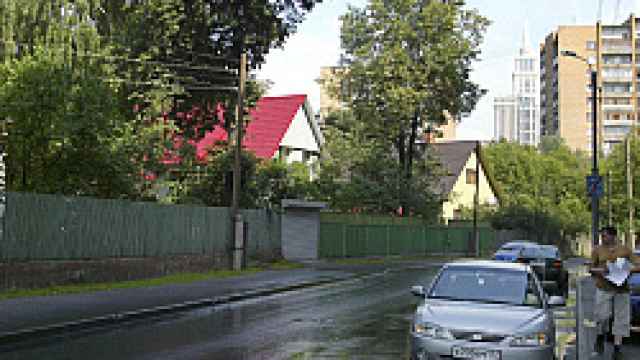Now Sokol is under threat from the pressures of capitalism.
The village was founded with the backing of Vladimir Lenin as the country's first cooperative settlement. Artists and thinkers populated a meticulously planned, star-shaped village with unpaved streets -- all just 10 kilometers from the Kremlin.
Their wooden homes, vegetable patches and backyard geese survived Stalin's purges, World War II, a tornado, and numerous attempts to raze them. Today, the village is the capital's last oasis of tranquil rural life amid the chaos of a city on the move.
Sokol is again endangered -- this time from Russia's new class of multi-millionaires.
Property is being snapped up in Moscow at such a frenzied pace that the capital this year was rated the world's most-expensive city.
Sokol, founded in 1923, is not immune to the property boom. But the mega-rich are more interested in its land than in its quaint wooden homes.
Meticulously carved wooden fences are making way for metal walls with security cameras. Extravagant villas now loom over the original low-slung dwellings.
"Right away, it's huge fences, intercoms, security cameras ... big dogs," said Marina Faydysh, an artist who has lived in Sokol since her birth in 1946. "They're aliens."
But in an irony lost on few Sokolites, those fabulously wealthy aliens -- who ride down the village's recently paved streets in Bentleys -- may be the village's best hope for being spared the even more ignoble fate: seeing their homes replaced by bland apartment towers.
"They built homes of their own here, and I think they'll fight for those homes," said Mikhail Rychagov, the chairman of the village council, who said a 1,000-square-meter plot recently went for $1.5 million.
Yet he acknowledged, Sokol won't be the same: "It's a double-edged sword."
Rychagov estimated that 60 percent of Sokol's families have lived in the village for multiple generations. But as those lower middle-class families come under pressure to sell, Sokol's future as a village of creaky wooden houses is increasingly in doubt.
"A person making $100 a month can't live in a house worth several million, by definition," said a real-estate magnate who bought up two adjacent plots in Sokol in 2000 and now refuses to let himself be identified because he's had enough publicity already.
"Moscow is an eclectic city, and our village is eclectic," he went on. "I don't know if this is good or bad, but with time, it won't be like that any more."
Among Sokol's planners were Alexei Shchusev, the architect who later designed Lenin's mausoleum, and Pavel Florensky, a renowned theologian and artist. In 1979, the village became an official monument to Soviet-era town planning.
 Mikhail Metzel / AP Sokol's aging residents see a new threat: Russia's new class of millionaires. | |
The precedent on everyone's mind now is Butovo -- a well-situated village on the outskirts of Moscow that a court decided belonged to the local government, which planned to build high-rise apartment blocks there.
In June, Butovo residents were dragged from their homes by riot police, as old women holding religious icons shrieked on the sidelines.
"I think there'll be a very big war here," Rychagov said.
Natalya Maximova, the head of a regional office that oversees building, said the government would not touch Sokol until 2020, when its designation as an architectural landmark expires.
But Rychagov said he could not get the same guarantee from another official.
Regardless of whether the local authorities keep their pledge not to disturb Sokol, the village is fast becoming a community of expensive villas -- some tasteful and understated, others gaudy.
Rychagov was resigned to that fate. "Russia is also changing. If 20 years ago Russia was Soviet, now it's capitalist, or something like that," Rychagov said.
But old-time Sokol residents still rely on Soviet-style services: To this day many home repairs are provided by the village council. Aging Sokolites now see capitalism taking over the old system in their village, just as it already has in the metropolis that surrounds them.
"Of course, with time this will be a bandits' neighborhood, an elite neighborhood," Faydysh said.
A Message from The Moscow Times:
Dear readers,
We are facing unprecedented challenges. Russia's Prosecutor General's Office has designated The Moscow Times as an "undesirable" organization, criminalizing our work and putting our staff at risk of prosecution. This follows our earlier unjust labeling as a "foreign agent."
These actions are direct attempts to silence independent journalism in Russia. The authorities claim our work "discredits the decisions of the Russian leadership." We see things differently: we strive to provide accurate, unbiased reporting on Russia.
We, the journalists of The Moscow Times, refuse to be silenced. But to continue our work, we need your help.
Your support, no matter how small, makes a world of difference. If you can, please support us monthly starting from just $2. It's quick to set up, and every contribution makes a significant impact.
By supporting The Moscow Times, you're defending open, independent journalism in the face of repression. Thank you for standing with us.
Remind me later.


